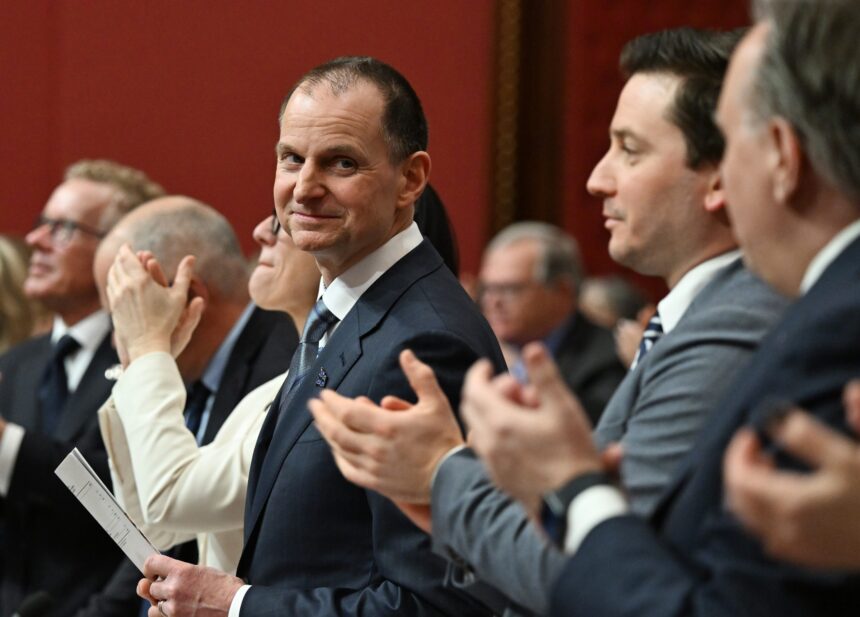Quebec’s surprising fiscal performance has turned heads as the provincial deficit landed $3.2 billion below what officials had projected just months ago. This financial twist raises important questions about the province’s economic resilience and what it might signal for taxpayers and businesses across la belle province.
When Finance Minister Eric Girard delivered his update yesterday at the National Assembly, the mood was noticeably upbeat. The deficit for the 2024-2025 fiscal year now sits at $4.1 billion instead of the $7.3 billion forecasted in the March budget – a 44% improvement that few economists had anticipated.
“We’re seeing stronger-than-expected revenue performance across several sectors,” Girard explained, pointing to income tax receipts that exceeded projections by $1.7 billion and corporate tax revenues that surpassed estimates by nearly $900 million.
But what’s driving this fiscal surprise? The answer appears multifaceted.
Quebec’s tech ecosystem has proven remarkably durable despite broader industry headwinds. Montreal-based artificial intelligence firms have continued expanding their footprint, with companies like Element AI and Mila attracting substantial investment. The resulting high-salary positions have bolstered personal income tax collections beyond what government economists had modeled.
“Quebec’s tech sector has matured to a point where it’s becoming a meaningful contributor to provincial finances,” notes Marie-Claude Brault, senior economist at Desjardins. “What started as a cluster of promising startups has evolved into an ecosystem with substantial payrolls and tax contributions.”
Resource sectors also delivered unexpected strength. Mining operations, particularly those focused on critical minerals needed for electric vehicle batteries, reported higher profits than anticipated as global demand intensified. The provincial government collects royalties on these operations, creating a direct link between commodity markets and Quebec’s bottom line.
However, not all the improvement stems from economic dynamism. Government spending restraint accounts for approximately 35% of the narrowed deficit, according to finance ministry documents. Several major infrastructure projects faced delays, pushing hundreds of millions in planned expenditures into future fiscal years.
Healthcare spending – traditionally the province’s largest budget item – came in $780 million below projections despite ongoing concerns about wait times and staffing shortages. This underutilization of allocated funds has sparked criticism from opposition parties.
“A deficit reduction built on failing to deliver promised healthcare improvements is nothing to celebrate,” said Québec Solidaire finance critic Haroun Bouazzi during question period. “The government is effectively balancing its books on the backs of patients waiting months for necessary procedures.”
The improved fiscal picture comes against a backdrop of persistent inflation challenges. While Quebec’s inflation rate has moderated to 2.4% according to the latest Statistics Canada data, prices for essentials like food and housing remain substantially higher than pre-pandemic levels.
For everyday Quebecers, the question becomes whether this financial windfall will translate into relief. Premier François Legault hinted at the possibility, though stopped short of making specific commitments.
“With each dollar of improved fiscal performance, we create more room to support families dealing with cost-of-living pressures,” Legault said when asked about potential tax adjustments. “But we must remain prudent given the uncertain economic outlook globally.”
Economic observers caution that while the improved deficit position is welcome news, structural challenges remain. Quebec’s aging demographic profile continues to pressure healthcare and pension systems, while the province’s debt-to-GDP ratio remains among the highest in Canada.
“This is definitely positive, but represents a single data point rather than a trend reversal,” said Philippe Lapointe of the Montreal Economic Institute. “Quebec still faces significant long-term fiscal headwinds that require structural reforms rather than cyclical improvements.”
Business leaders have seized on the improved numbers to advocate for competitiveness-enhancing measures. The Quebec Business Council argues that the fiscal overperformance creates an opportunity to address the province’s relatively high corporate tax rates, which they claim hampers investment.
“When government finances exceed expectations, it creates space to address structural competitiveness issues,” said council president Marie-Eve Bédard. “Quebec businesses face among the highest combined tax burdens in North America, which affects our ability to attract and retain enterprises.”
Financial markets have responded positively to Quebec’s fiscal update. The spread between Quebec and Ontario provincial bonds narrowed slightly following the announcement, indicating marginally improved investor confidence in Quebec’s financial trajectory.
The provincial government maintains its commitment to returning to balanced budgets by 2027-28, though analysts question whether this timeline remains too ambitious given ongoing economic uncertainties and spending pressures.
As Quebec navigates this improved but still challenging fiscal landscape, the debate shifts to whether this unexpected breathing room should be used for tax relief, debt reduction, or reinvestment in public services. For a province with ambitious climate goals, infrastructure needs, and persistent healthcare challenges, the choices made will shape Quebec’s economic competitiveness and social cohesion for years to come.
The next full budget is expected in March 2026, giving policymakers several months to determine how this fiscal improvement might translate into longer-term economic strategy.






